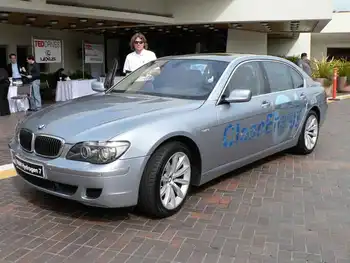Some Volt work headed to Oshawa: GM
By Toronto Star
High Voltage Maintenance Training Online
Our customized live online or in‑person group training can be delivered to your staff at your location.

- Live Online
- 12 hours Instructor-led
- Group Training Available
The big Detroit-based automaker unveiled the planned production model of the Volt and confirmed a $40 million research project focused on further vehicle electrification and other fuel efficiency improvements will be carried out at the company's engineering centre in Oshawa, Ont.
Ontario Power Generation, the province's dominant electricity generator, and universities, including the University of Ontario Institute of Technology in Durham Region, will play an important role in this research, said GM.
The company will also work with the province's electricity sector on a public education campaign about the environmental benefits of driving electric cars.
"This collaboration is a natural fit for both GM and OPG," said Tom Mitchell, Ontario Power Generation's chief nuclear officer.
"GM is working towards a future of clean transportation, and OPG is working towards a future of dramatically reduced greenhouse gas emissions, with our reliance on nuclear and hydroelectric generation."
Bob Lutz, GM's vice-chairman, said the Volt is paving a "shining path ahead" for a company that had begun to doubt itself.
Lutz, who oversees global product development at GM, said the company has been under "quite a bit of reputational pressure" ever since it released the gas-guzzling Hummer H2 around the same time Toyota released its hybrid Prius.
"The media just loved to characterize Toyota as this environmentally sensitive, high-technology company that wisely saw this situation coming and produced this gasoline-electric Prius with this sensational fuel economy," Lutz said in a recent interview.
"Meanwhile, at the other end of the spectrum, bad old General Motors just doesn't get it, they're doing Hummer H2s and they expect us to buy these 11-mile-per-gallon monsters.
"So this halo surrounding Toyota on fuel economy and technology leadership was more and more costing us business... and I thought, 'Whoa, it's time to do something here."'
Lutz said he wanted to create a fully electric prototype vehicle, but one of GM's engineers told him that would require far too much battery power and would be far too expensive to ever become a feasible consumer product.
Instead, the engineer suggested the company develop a form of plug-in hybrid that can run for 40 miles, or about 65 kilometres, on pure electricity – more than any other hybrid out there.
"In North America about 80 per cent of people drive 40 miles a day or less. That 80 per cent, if they all drove Chevy Volts, they would never use another drop of gasoline in their lives," said Lutz.
The Volt won the 2007 North American Specialty Concept of the Year and Most Significant Concept Vehicle of the Year awards at the Detroit Auto Show – part of what Lutz called "an overwhelming response" that prompted GM to put what was originally a concept car into production.
The Volt will be produced at a General Motors plant in Hamtramck, Mich., starting in 2010.
Lutz said the Volt is "having a hugely motivating effect" on GM's employees.
"(The Volt) is rallying the company around a new purpose and giving all of the employees the sense that, 'By George, we are the most capable automobile company in the world,"' he said.
"We may have lost the recipe for a while and we may have even begun to doubt ourselves, but now we see a shining path ahead to place General Motors where it belongs, which is in a leadership position in automotive technology. The employee enthusiasm for this is amazing."
The Canadian auto industry has been beset by a series of layoffs and plant closures as a high Canadian dollar and skyrocketing fuel prices hurt the competitive stance of the so-called Detroit Three automakers – GM, Ford and Chrysler.
GM has been hit particularly hard and, in one of the worst blows the sector has seen in recent years, announced in June that it would close its truck plant in Oshawa, putting 2,600 workers out of a job.
Production cuts at GM have also affected several auto-parts manufacturers, many of which have been forced to lay off workers or shut down entirely as demand slumps for gas-guzzling pickup trucks and SUVs.











